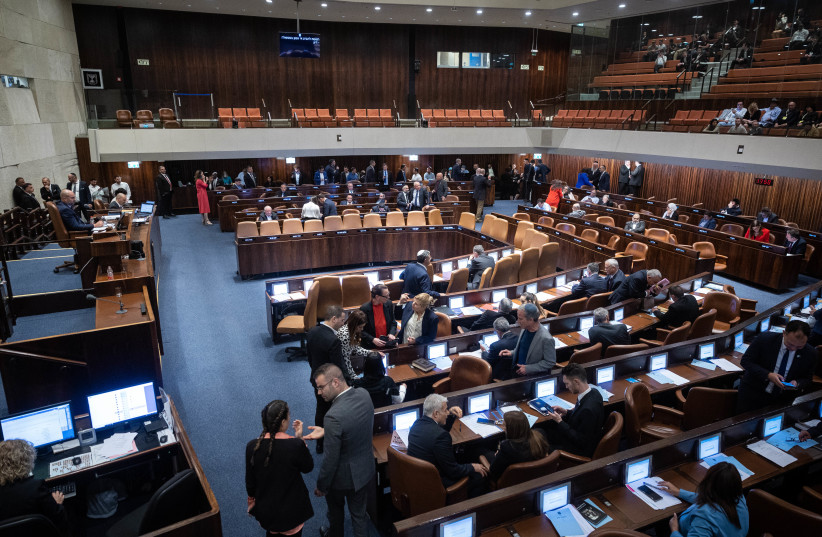Is the Israeli government, budget actually in peril? – analysis
11 Knesset members have still not committed to voting in favor of the budget, even though the marathon debate on the Knesset floor begins today, and voting will begin on Tuesday evening.
The budget must pass by next Monday, May 29. If it does not, the Knesset automatically disperses and an election is called.
After months of unrest and crisis, over judicial reform, haredi conscription, funds for haredi private schools, the Arnona Fund and more – will the government fall simply because it failed to pass the budget on time?
The short answer is, most likely, no.
But the chances of this happening have grown from nearly zero last week, to a possible, but highly unlikely, scenario.
 The assembly hall of the Knesset, the Israeli parliament in Jerusalem, on March 13, 2023 (credit: YONATAN SINDEL/FLASH90)
The assembly hall of the Knesset, the Israeli parliament in Jerusalem, on March 13, 2023 (credit: YONATAN SINDEL/FLASH90)Where are the threats coming from?
There are threats coming from three fronts: Otzma Yehudit (six MKs), Agudat Yisrael (four MKs, including Housing Minister Yizhak Goldknopf, who resigned as an MK but can return to the Knesset easily), and Noam’s MK Avi Maoz.
The weakest threat is Maoz’s. He has one vote, and his demand, to approve a government decision for a “Jewish National Identity Authority” that he was promised, is strange, considering the fact that he resigned as a deputy minister back in February. Maoz may have considered rejoining the government if he was given his request, but he has very little leverage and is unlikely to bring down the right-wing government if his vote is the deciding one. His threat, which came after those of Otzma and Agudat Yisrael, seems like a feeble attempt to jump on the bandwagon of trying to secure last minute funds while he still can.
The Otzma Yehudit is slightly more serious, but not by much. The party is upset. It claims that it received a promise that its party member, Development of the Negev and Galilee and National Resilience Minister, MK Yizhak Wasserlauf, would receive equal coalition funding to that of Religious Zionist Party’s National Missions Minister, Orit Struk. But Struk ended up getting nearly three times the amount that Wasserlauf received, according to the current proposal.
The chamber of Otzma’s pistol, however, is empty. Would the party leader, National Security Minister Itamar Ben-Gvir, bring down a government when he already is barely passing the electoral threshold in the polls? Ben-Gvir is considered the most volatile member of the coalition and could at some point quit the government, but that does not immediately mean that he would support the Knesset’s dissolvement. Now, voting against the budget by definition brings down the government, and Ben-Gvir would not gain any popularity amongst his potential voters by doing so.
Ben-Gvir succeeded in forcing Prime Minister Benjamin Netanyahu’s hand in March, when he earned a promise to form a National Guard in exchange for dropping his threat to leave the government over the prime minister’s announcement of a freeze to the judicial reform legislation. A few weeks ago, Ben-Gvir again managed to do some damage when he accused Netanyahu of being weak on terror. But Operation Shield and Arrow brought that to an abrupt halt. The bottom line is that Ben-Gvir could give Netanyahu a headache in the coming week, but there is quite a distance between that and bringing down the government.
What is the most serious threat?
The most serious threat is that of Agudat Yisrael, which is demanding over NIS 600 million more in coalition funding for its school systems than it currently received.
Caving to Agudat Yisrael’s demand would make Netanyahu and Finance Minister Bezalel Smotrich look even worse than they do already for giving billions of shekel to support schools that do not teach core secular studies and thus do not prepare their pupils for the workforce.
 Prime Minister Benjamin Netanyahu with Foreign Minister Eli Cohen assembly hall of the Knesset, the Israeli parliament in Jerusalem, on March 13, 2023 (credit: YONATAN SINDEL/FLASH90)
Prime Minister Benjamin Netanyahu with Foreign Minister Eli Cohen assembly hall of the Knesset, the Israeli parliament in Jerusalem, on March 13, 2023 (credit: YONATAN SINDEL/FLASH90)In addition, caving to the demand would mean amending the budget bill, which already passed the Knesset Finance Committee. Such an amendment would force the bill back to the Finance Committee. This will both delay the beginning of the final voting on the budget in the Knesset plenum, and give the opposition the opportunity to try to delay the committee as much as possible, as well as to attempt to draw even more media attention to the problematic aspects of the coalition funds and amp up the pressure on the coalition.
However, if Netanyahu and Smotrich simply ignore Agudat Yisrael, then the Hassidic party said it would bring the decision whether or not to support the budget to its Council of Torah Sages. This is a wild card. The Council, which will receive the input of Agudat Yisrael’s Knesset members, are unlikely to decide to bring down the government, as it is far more conservative, tradition-oriented and pro-Torah study then any other possible alternative.
However, some of Agudat Yisrael’s leadership have shown in the past few years that they were willing to enter into programs developed by the previous government, which included opposition leader Yair Lapid and MK Avigdor Liberman, both of whom are very unpopular on the haredi street. By using a backchannel via Yesh Atid MK Moshe Turpaz, during 2021 and 2022 Yesh Atid developed some trust with parts of the Hassidic leadership as part of the “Belz Agreement,” in which some of the Hassidic groups agreed to enter a study program that included core secular studies and education ministry oversight, in exchange for funds to save their school systems, which were under financial strain.
While a Yesh Atid-led government may not speak as highly about Torah study, the Hassidic leaders may reason that at least with Lapid, they were guaranteed funding for their schools, and they believed that the funding would actually come through. Even Liberman, the Knesset’s most outspoken opponent of the haredi parties, was on board and, as finance minister, intended to respect the agreement. With Netanyahu, they received promise after promise – that a haredi conscription bill would pass by the time the budget passes, that they would receive full funding for their school systems during 2023, and more – but came up empty.
The chances of Agudat Yisrael risking such a pro-religious government are still low. But they exist, and, by the end of this week, the party will need to decide.





Comments are closed.